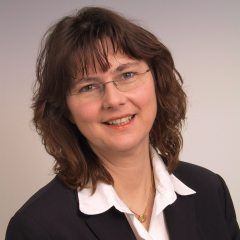
Márta has broad working experience Europe wide in business and public environment. She dealt with initiation and transaction of trade agreements, taught Business Studies, managed social association and did consultancy work. She gathered her interest on ICT while establishing "New Media" by a traditional German manufacturing company.
In 2005 Márta joined the EC as the Head of Unit of "ICT for the Environment" in DG INFSO and developed her Unit further to "ICT for Sustainable Growth" linked to the integrated climate and energy policy. After her move to Luxembourg in 2008 she served as Head of Unit "Technologies for Information Management" with focus on research and development funding of innovative ICT technologies supporting the creation of intelligent digital objects and knowledge management, later on the efficient management of extremely large scale data including Open Data. Since July 2012 she is in charge of the Data Value Chain Unit and builds up on a strategy to extract the maximum value from data by building on the intelligent use of data sources across the European Union and beyond. She was deeply involved into the EC Communication "Towards a thriving data-driven economy" and is a driving force in the work towards a European Public Private Partnership on "Big Data Value".
Presentation abstracts
Plenary session 1: Setting the Strategic Agenda for the Multilingual Digital Single Market
The Digital Single Market (DSM) means that consumers can buy products and services online across borders. It also means that companies and citizens can interact with authorities and find information about their rights and obligations in the whole EU. There are still many obstacles to be tackled before Digital Single Market is a reality. Language barriers are one of the most obvious challenges: if you don’t understand the language on your screen, no transaction will happen, no deal will be concluded.
The language technology industry is invited to provide practical and functional solutions to overcome language barriers in the DSM. Much of the technology is mature enough to deliver solutions, but gaps do exist: languages that are not covered, insufficient quality of machine translation etc. The Strategic Agenda should identify the multilingual challenges of DSM, indicate how the solutions would be delivered, and how the gaps would gradually be filled. The work done so far to develop the Agenda has provided a promising basis for further elaboration.
Plenary session 2: Breaking the Language Barrier for Cross-Border Public Services
Two major trends are apparent: public services are moving online, and there is an emerging need for pan-European public services that address the 500 million citizens of the EU. These services range from healthcare and consumer rights to public procurement and digital libraries. Such pan-European public services need to be multilingual, in order to serve and to reach out to the speakers of 24 different languages in the EU. Human resources available for translation are too limited to cope with this task. Therefore, automated translation and other tools must be applied to ensure that all European citizens can use the services in their own language. But more is needed than just translation – the concept structures of the public services must be made linguistically compatible. With the Connecting Europe Facility programme, the European Commission is supporting the deployment of pan-European public services – and making them multilingual.